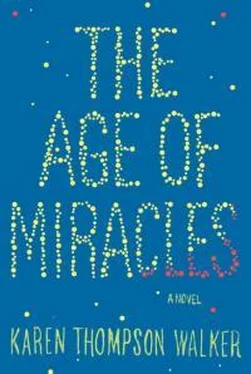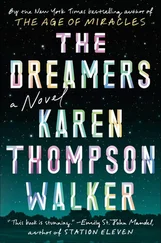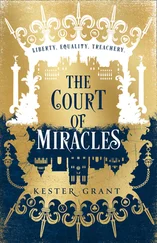“What?”
He looked at me, surprised. I understood then that it was a mistake to mention it.
My father was quiet. I could feel my cheeks turning hot and red. He used two fingers like tweezers to pick up the last stray feather from the deck and drop it into the sack. Then he rubbed his forehead with the back of one bent wrist.
“No, sweetheart,” he said. “No one died.”
This was the first lie I ever heard my father tell—or the first time I knew that he was lying. But it would not be the last. And not the boldest, either.
On the deck where the bird had lain, a hundred ants ran in circles, in search of their lost feast.
My father pulled the trash bag’s drawstring shut and tied it firmly at the top.
“You and your mom worry too much as it is,” he said. “I told you two that nothing would happen overnight, and see? Nothing did.”
We took the bag to the garbage cans on the other side of the house. The bird’s dark silhouette showed through the white plastic as we walked, the body folding in on itself as the bag swung in time to my father’s quick paces.
He pulled the hose out to the deck and washed away the ants and the blood, but a spot of grease would remain on the window for weeks, like skid marks after a car accident.
Finally, he went upstairs to sleep, and my mother went with him.
I sat alone in the living room for a long time, watching television, while my parents murmured together through the closed door of their bedroom. I heard my mother ask a question. My father raised his voice: “What is that supposed to mean?”
I turned the television down and strained to hear the rest.
“Of course I was at work,” he said. “Where the hell else would I be?”
We were living under a new gravity, too subtle for our minds to register, but our bodies were already subject to its sway. In the weeks that followed, as the days continued to expand, I would find it harder and harder to kick a soccer ball across a field. Quarterbacks found that footballs didn’t fly as far as they used to. Home-run hitters slipped into slumps. Pilots would have to retrain themselves to fly. Every falling thing fell faster to the ground.
And it seems to me now that the slowing triggered certain other changes too, less visible at first but deeper. It disrupted certain subtler trajectories: the tracks of friendships, for example, the paths toward and away from love. But who am I to say that the course of my childhood was not already set long before the slowing? Perhaps my adolescence was only an average adolescence, the stinging a quite unremarkable stinging. There is such a thing as coincidence: the alignment of two or more seemingly related events with no causal connection. Maybe everything that happened to me and to my family had nothing at all to do with the slowing. It’s possible, I guess. But I doubt it. I doubt it very much.
New minutes kept flooding in with every hour. Two days had passed. Now it was Monday. There was no new news.
I’d been hoping that school would be canceled—all the kids were. Instead, school was simply delayed. A hasty plan had been devised to push back our start time by ninety minutes, roughly the amount by which we were running behind.
We’d been asked by the government to carry on as usual. This was not true later, obviously, but for now our leaders stood before microphones, dressed in dark suits and red ties, American-flag pins glinting from navy blue lapels. Mostly, they talked economics: Go to work, spend money, leave your cash in the banks.
“They’re definitely not telling us everything,” said Trevor Watkins at the bus stop that Monday morning. More than half the kids who usually waited there had stayed home or left town with their families.
I missed Hanna like a phantom limb.
“It’s just like Area 51,” said Trevor, chewing the frayed black straps of his backpack. “They never tell the public the truth.”
Our lives were mild back then. We were girls in sandals and sundresses, boys in board shorts and surf shirts. We were growing up in a retiree’s dream—330 days of sunshine each year—and so we celebrated whenever it rained. Catastrophe, too, like bad weather, was provoking in all of us an uneasy excitement and verve.
From the other side of the lot came the echo of a skateboard striking the curb. I knew who it was without looking, but I wanted to look: Seth Moreno—tall and quiet and always on his own, now stepping carefully off of his skateboard and into the dirt, his dark hair falling into his eyes as he moved. I had never spoken much to Seth Moreno, but I had perfected a way of watching him that didn’t look like I was watching.
“Trust me,” Trevor went on. Trevor was skinny and friendless, and his enormous green backpack was so heavy that it forced him to hunch forward, like an old man, for balance. “The government knows a lot more than they’re saying.”
“Shut up,” said Daryl. Daryl was the new kid, the bad kid, the kid who left fourth period every day to go to the nurse’s office to swallow a dose of Ritalin. He was the kid we all tried to avoid. “No one’s listening to you, Trevor.”
The bus stop was the hard ground where our school days always began, where insults were slung and secrets spilled or spread. We were standing where we always stood, in the same patch of dirt beside the same empty lot, the morning sun slanting at roughly the same slant. Our watches were useless, but the light felt right.
“I’m serious, you guys,” said Trevor. “This is the end of the world.”
“If that bus doesn’t show up in the next two minutes,” said Daryl, “I’m leaving.”
Daryl slouched against the chain-link fence that surrounded a neighboring vacant lot. Years earlier, the house that used to sit on that lot had slipped into the canyon along with a section of limestone cliff. You could still find remnants of the house below, splinters of wood tangled in the brush, shards of tile in the dirt. Not much was left of the property. A cracked driveway led nowhere. Weeds grew where the lawn once was. Yellow signs warned of the instability of the bluff.
“Here’s how it’s going to happen,” said Trevor. “First the crops are going to die. And then all the animals are going to die. And then the humans.”
But at that moment, my own anxieties were closer at hand: Without Hanna, I felt awkward standing alone on that curb. Even on a normal day, the bus stop was a bad place to be without a friend. Bullies reigned. No supervisor supervised here.
I decided to stand beside Michaela because we’d been elementary school friends, but those bonds had worn thin.
“Hey, Julia,” she said when she saw me. “You’re smart. Do you think this earth thing could screw up my hair somehow?” She was redoing her red ponytail. “Because my hair is going crazy today.”
She looked ready for the beach, in miniskirt and baby tee. Sequined flip-flops clung to her feet. My mother never would have let me wear flip-flops to school.
“I don’t know,” I said, regretting my practical outfit, white canvas tennis shoes double-knotted beneath plain jeans. “Maybe.”
These days, Michaela’s lips perpetually shimmered with gloss. Her hips perpetually swayed. Mascara streaked her cheeks at every soccer practice, and she spoke of boys in multitudes—it was hard to keep track of all her Jasons and Brians and Brads. How could I admit to her my own modest desire? How could I explain to her that for months I’d hoped to talk to just one boy who right then was waiting with us at the bus stop, slowly rolling his skateboard back and forth on the other side of the lot? Seth Moreno: like a blinking light in my head.
“Seriously,” said Michaela, holding up the ragged tip of her ponytail. “Look at all this frizz.”
Читать дальше












